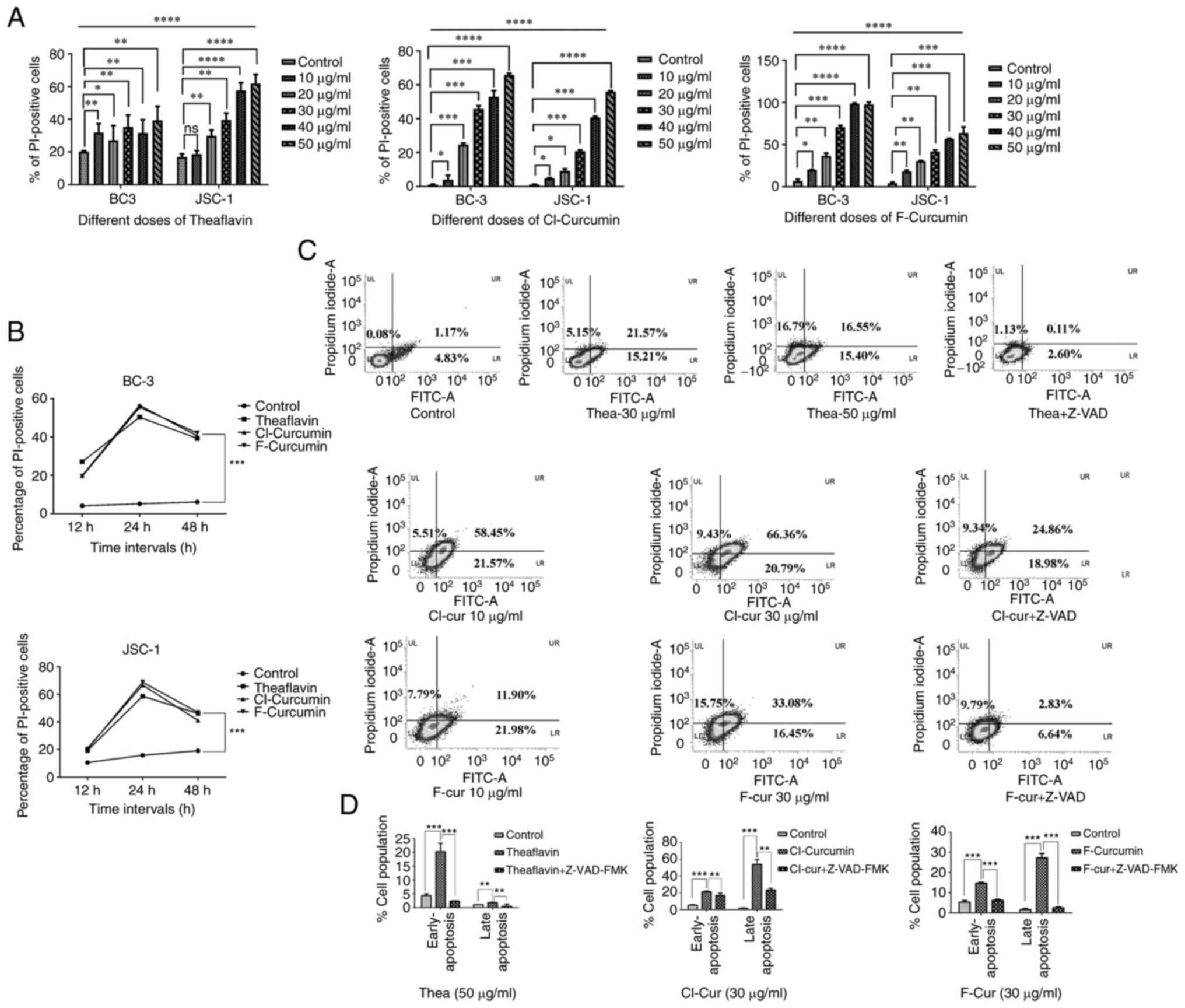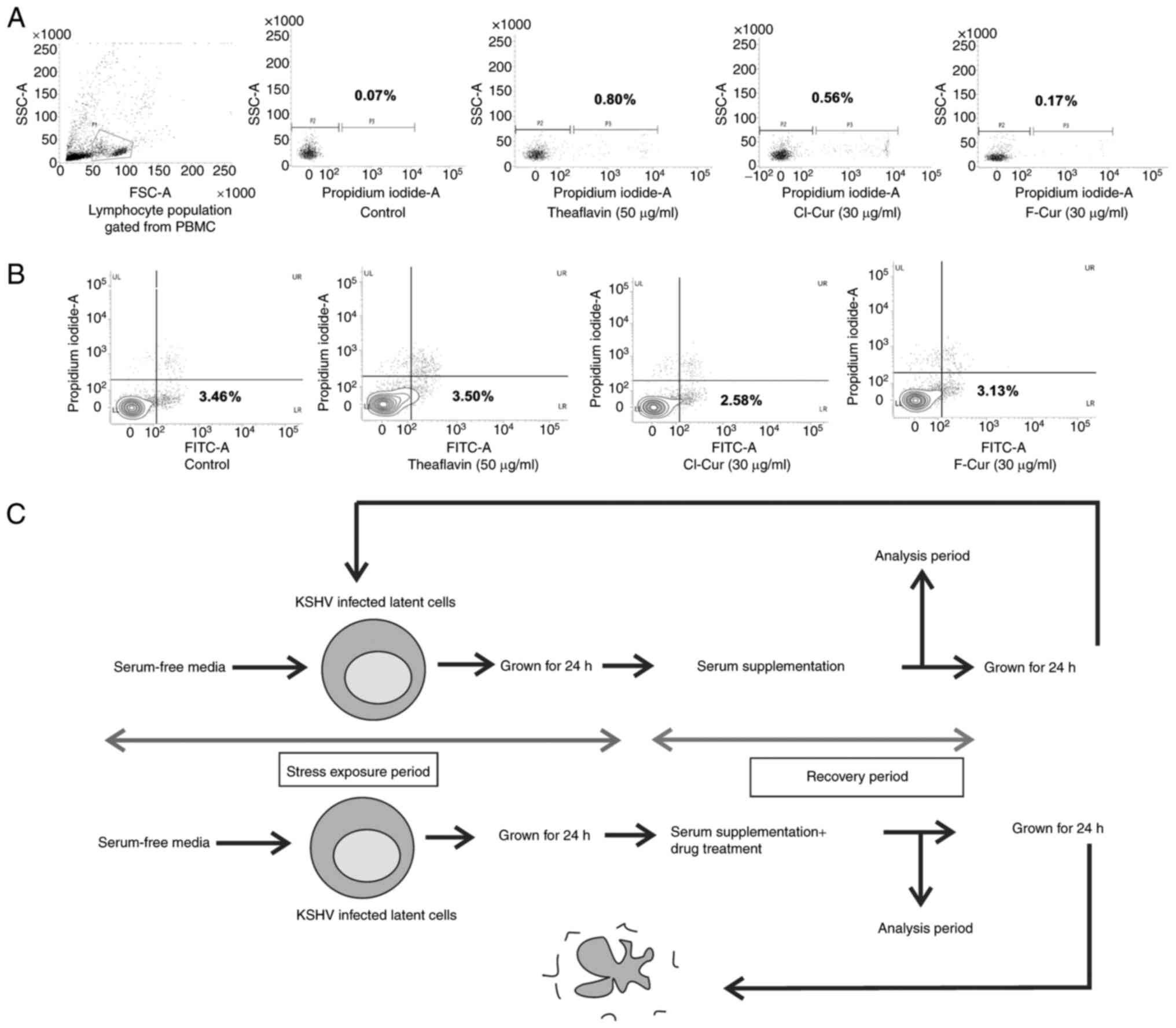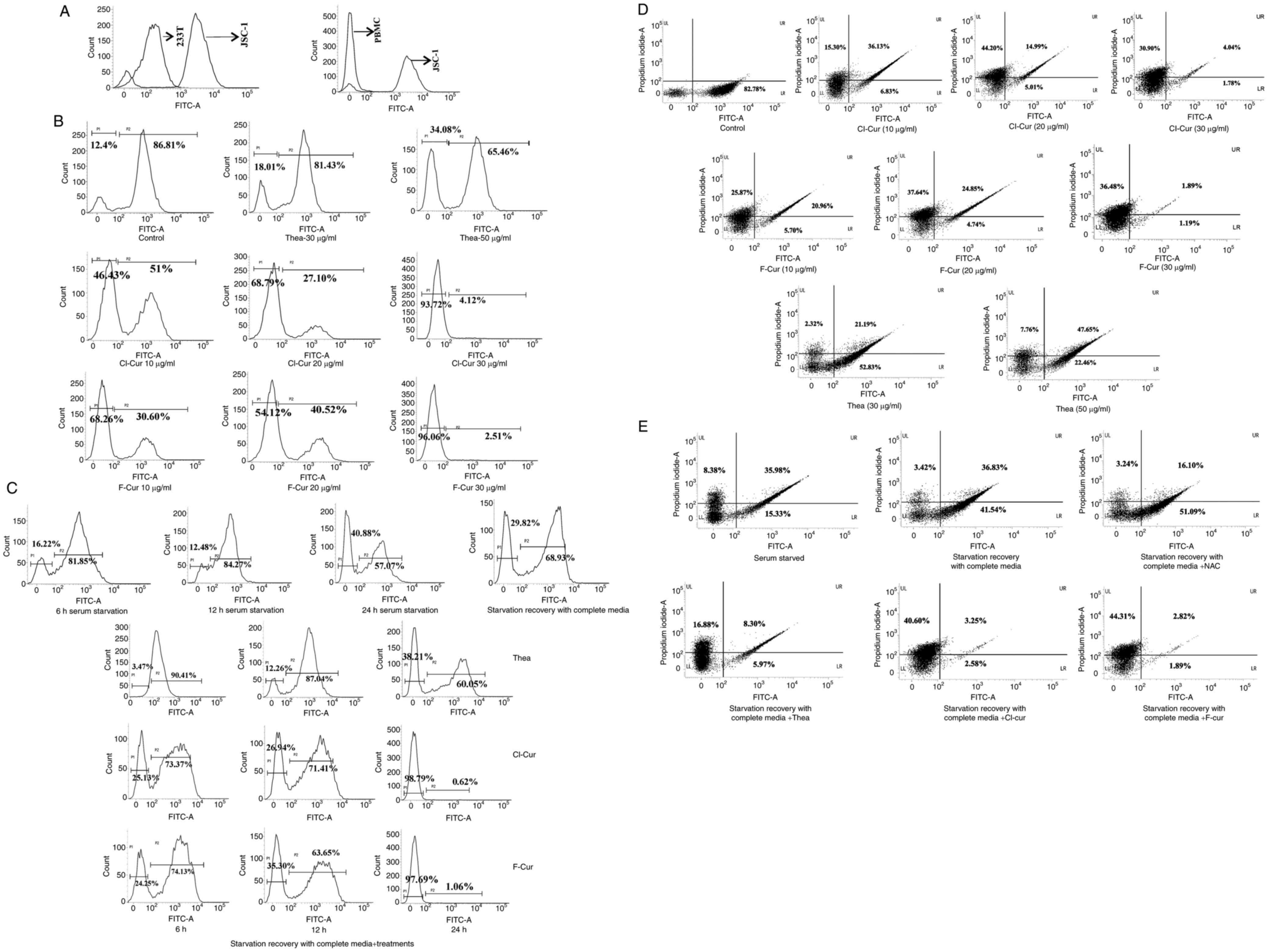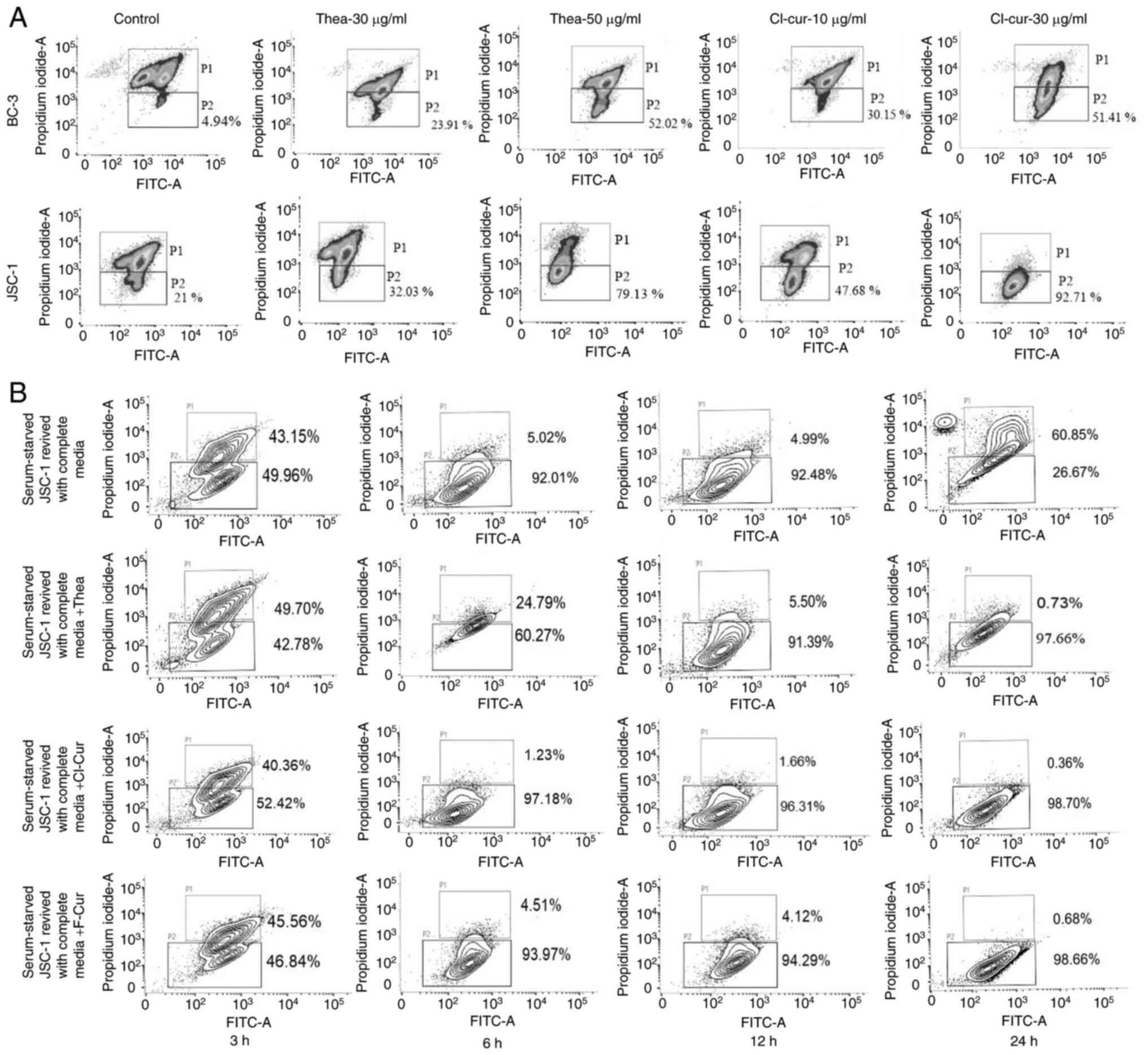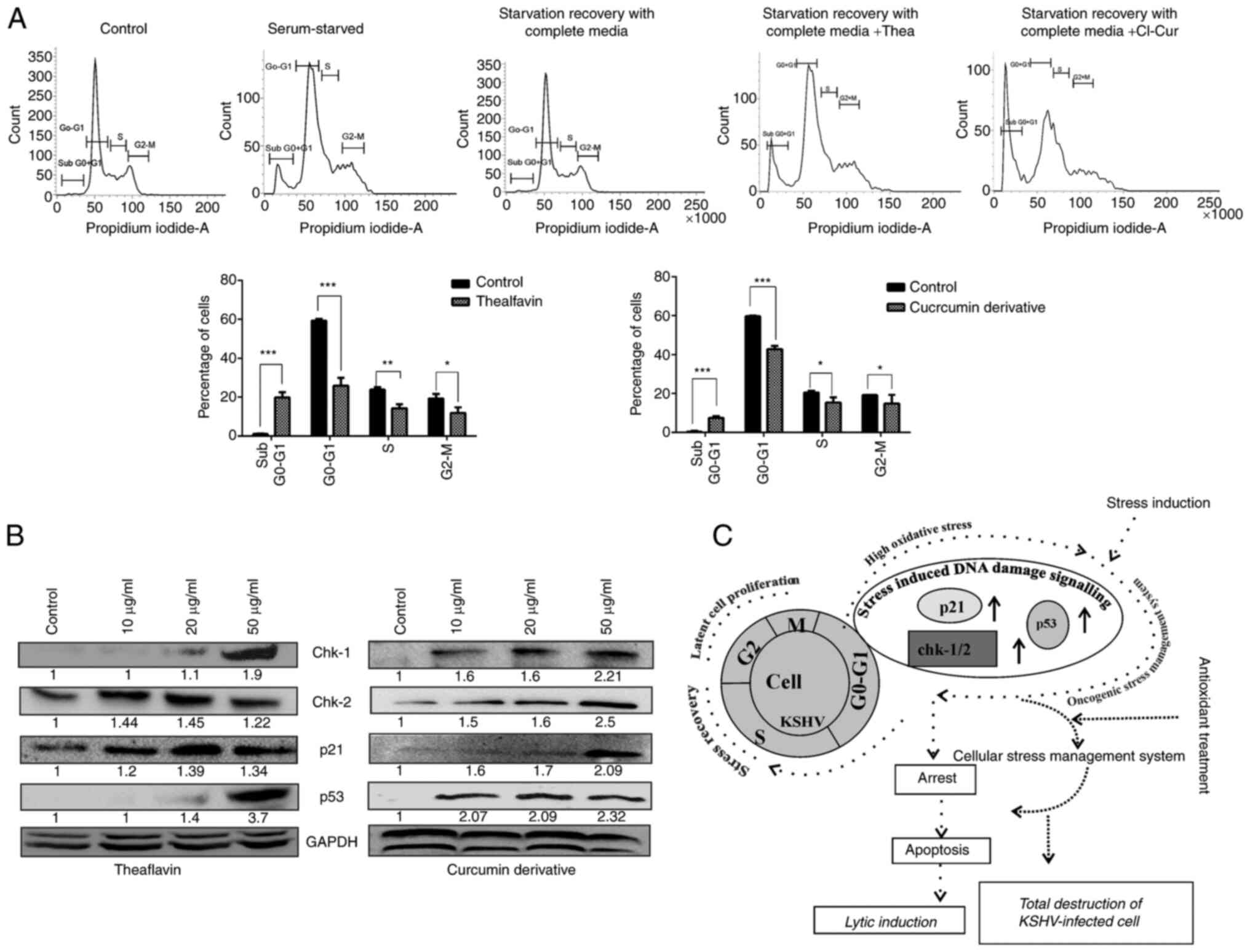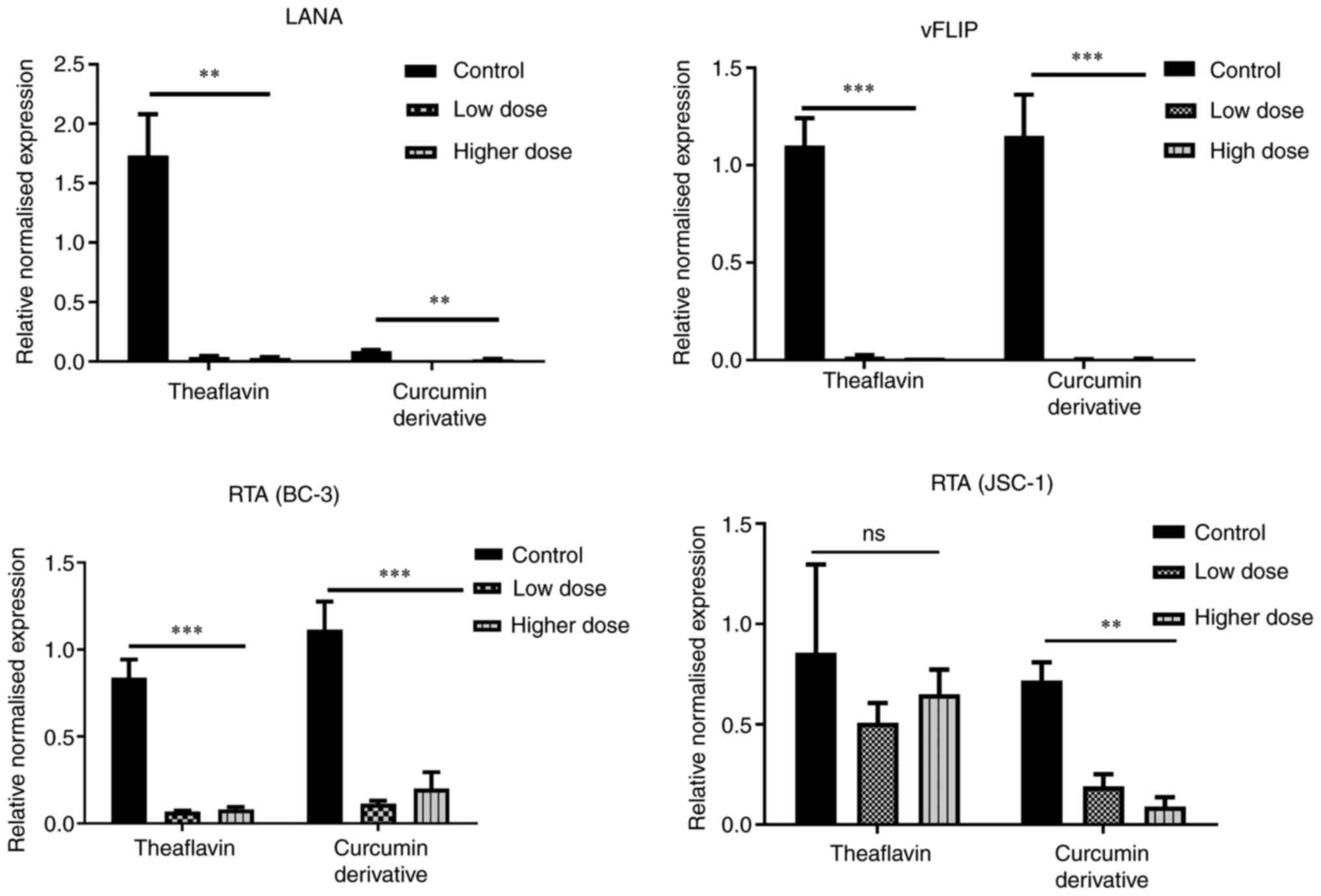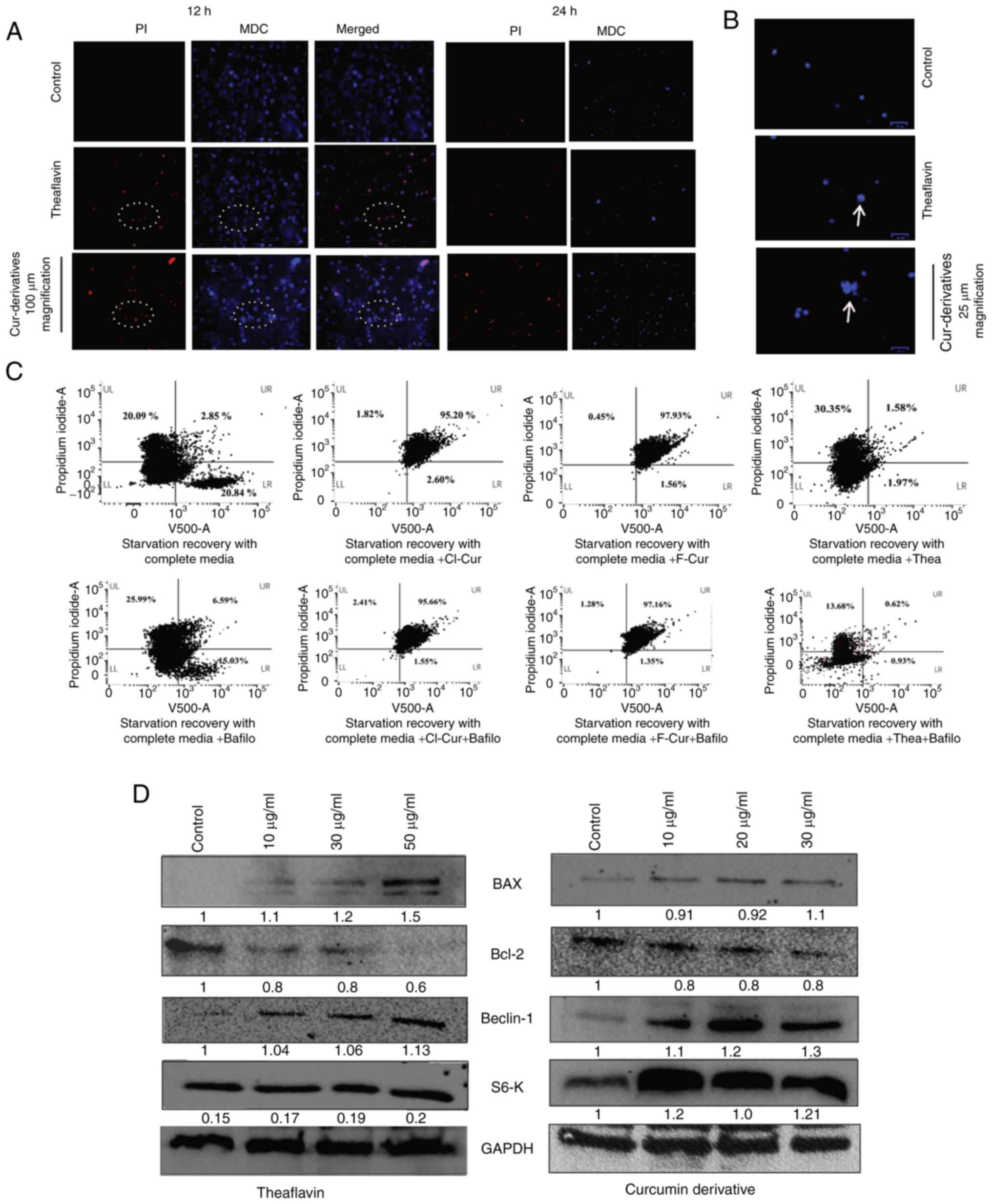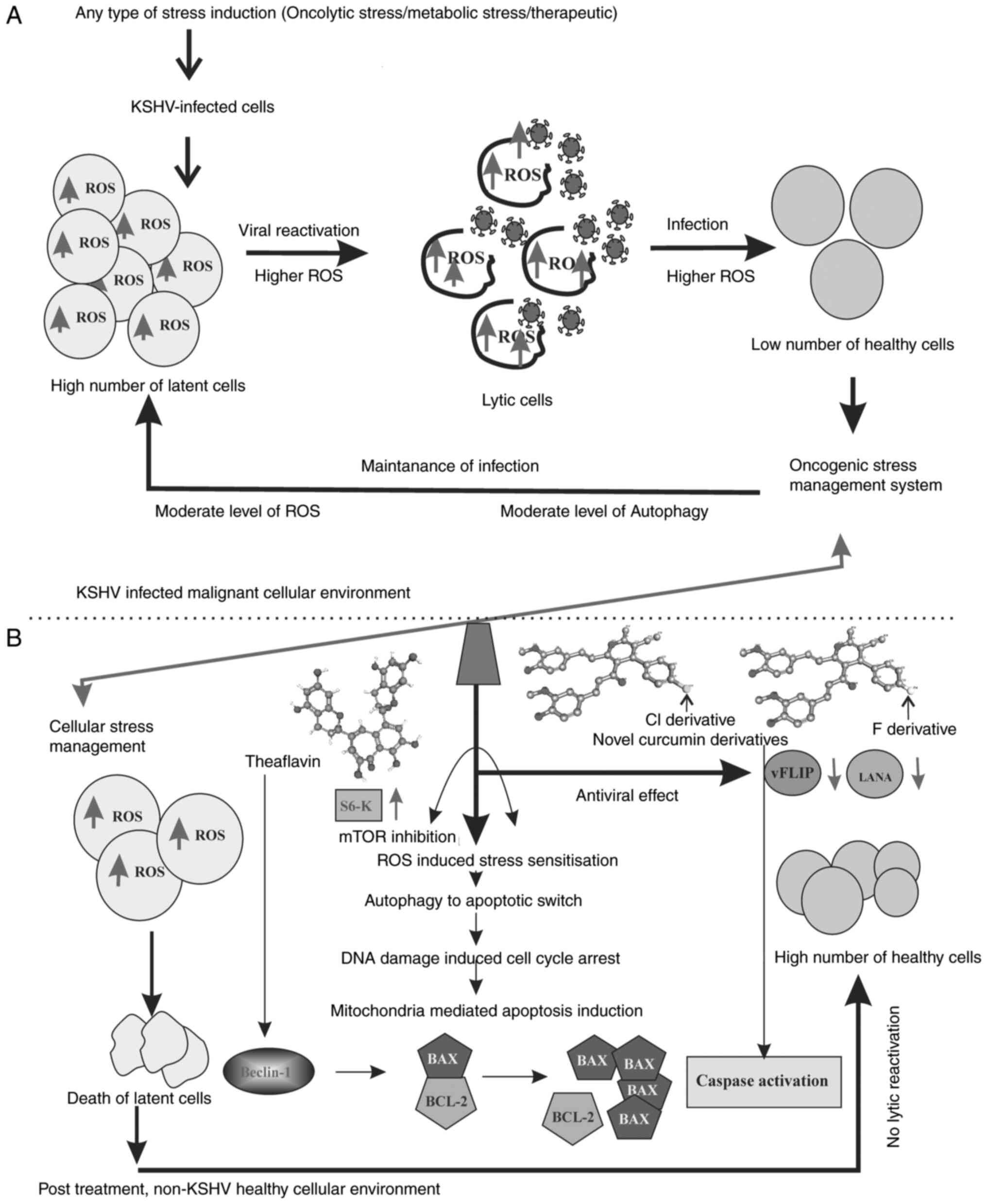|
1
|
Yarchoan R and Uldrick TS: HIV-associated
cancers and related diseases. N Eng J Med. 378:1029–1041. 2018.
View Article : Google Scholar
|
|
2
|
Stewart A, Chan Carusone S, To K,
Schaefer-McDaniel N, Halman M and Grimes R: Causes of death in HIV
patients and the evolution of an AIDS hospice: 1988-2008. AIDS Res
Treat. 2012:3904062012.PubMed/NCBI
|
|
3
|
Aneja KK and Yuan Y: Reactivation and
lytic replication of Kaposi's sarcoma-associated herpesvirus: An
update. Front Microbiol. 8:6132017. View Article : Google Scholar : PubMed/NCBI
|
|
4
|
Miller G, Heston L, Grogan E, Gradoville
L, Rigsby M, Sun R, Shedd D, Kushnaryov VM, Grossberg S and Chang
Y: Selective switch between latency and lytic replication of
Kaposi's sarcoma herpesvirus and Epstein-Barr virus in dually
infected body cavity lymphoma cells. J Virol. 71:314–324. 1997.
View Article : Google Scholar : PubMed/NCBI
|
|
5
|
Ye F, Zhou F, Bedolla RG, Jones T, Lei X,
Kang T, Guadalupe M and Gao SJ: Reactive oxygen species hydrogen
peroxide mediates Kaposi's sarcoma-associated herpesvirus
reactivation from latency. PLoS Pathog. 7:e10020542011. View Article : Google Scholar : PubMed/NCBI
|
|
6
|
Li X, Feng J and Sun R: Oxidative stress
induces reactivation of Kaposi's sarcoma-associated herpesvirus and
death of primary effusion lymphoma cells. J Virol. 85:715–724.
2011. View Article : Google Scholar :
|
|
7
|
Bottero V, Chakraborty S and Chandran B:
Reactive oxygen species are induced by Kaposi's sarcoma-associated
herpesvirus early during primary infection of endothelial cells to
promote virus entry. J Virol. 87:1733–1749. 2013. View Article : Google Scholar :
|
|
8
|
Davis DA, Rinderknecht AS, Zoeteweij JP,
Aoki Y, Read-Connole EL, Tosato G, Blauvelt A and Yarchoan R:
Hypoxia induces lytic replication of Kaposi sarcoma-associated
herpesvirus. Blood. 97:3244–3250. 2001. View Article : Google Scholar : PubMed/NCBI
|
|
9
|
Singh RK, Lamplugh ZL, Lang F, Yuan Y,
Lieberman P, You J and Robertson ES: KSHV-encoded LANA protects the
cellular replication machinery from hypoxia induced degradation.
PLOS Pathogens. 15. pp. e10080252019, View Article : Google Scholar
|
|
10
|
Granato M, Gilardini Montani MS,
Angiolillo C, D'Orazi G, Faggioni A and Cirone M: Cytotoxic drugs
activate KSHV lytic cycle in latently infected PEL cells by
inducing a moderate ROS increase controlled by HSF1, NRF2 and
p62/SQSTM1. Viruses. 11:82018. View Article : Google Scholar
|
|
11
|
Sharma B: Oxidative stress in HIV patients
receiving antiretroviral therapy. Curr HIV Res. 12:13–21. 2014.
View Article : Google Scholar : PubMed/NCBI
|
|
12
|
Saavedra-García P, Roman-Trufero M,
Al-Sadah HA, Blighe K, López-Jiménez E, Christoforou M, Penfold L,
Capece D, Xiong X, Miao Y, et al: Systems level profiling of
chemotherapy-induced stress resolution in cancer cells reveals
druggable trade-offs. Proc Natl Acad Sci. 118:e20182291182021.
View Article : Google Scholar : PubMed/NCBI
|
|
13
|
Singh K, Bhori M, Kasu YA, Bhat G and
Marar T: Antioxidants as precision weapons in war against cancer
chemotherapy induced toxicity - Exploring the armoury of obscurity.
Saudi Pharm J. 26:177–190. 2018. View Article : Google Scholar : PubMed/NCBI
|
|
14
|
Mut-Salud N, Álvarez PJ, Garrido JM,
Carrasco E, Aránega A and Rodríguez-Serrano F: Antioxidant intake
and antitumor therapy: Toward nutritional recommendations for
optimal results. Oxid Med Cell Longev. 2016:67195342016. View Article : Google Scholar
|
|
15
|
Bouayed J and Bohn T: Exogenous
antioxidants--Double-edged swords in cellular redox state: Health
beneficial effects at physiologic doses versus deleterious effects
at high doses. Oxid Med Cell Longev. 3:228–237. 2010. View Article : Google Scholar : PubMed/NCBI
|
|
16
|
Brahmachari G and Mandal M: One-pot
multicomponent synthesis of a new series of curcumin-derived
4H-pyrans under ambient conditions. J Heterocycl Chem. 57:744–750.
2020. View Article : Google Scholar
|
|
17
|
Broussard G and Damania B: Regulation of
KSHV latency and lytic reactivation. Viruses. 12:10342020.
View Article : Google Scholar :
|
|
18
|
Gam Ze Letova C, Kalt I, Shamay M and
Sarid R: Latently KSHV-infected cells promote further establishment
of latency upon superinfection with KSHV. Int J Mol Sci.
22:119942021. View Article : Google Scholar : PubMed/NCBI
|
|
19
|
Raja R, Lata S, Trivedi S and Banerjea AC:
Serum deprivation/starvation leads to reactivation of HIV-1 in
latently infected monocytes via activating ERK/JNK pathway. Sci
Rep. 8:144962018. View Article : Google Scholar : PubMed/NCBI
|
|
20
|
Iki S, Yokota S, Okabayashi T, Yokosawa N,
Nagata K and Fujii N: Serum-dependent expression of promyelocytic
leukemia protein suppresses propagation of influenza virus.
Virology. 343:106–115. 2005. View Article : Google Scholar : PubMed/NCBI
|
|
21
|
Palmisano I, Della Chiara G, D'Ambrosio
RL, Huichalaf C, Brambilla P, Corbetta S, Riba M, Piccirillo R,
Valente S, Casari G, et al: Amino acid starvation induces
reactivation of silenced transgenes and latent HIV-1 provirus via
down-regulation of histone deacetylase 4 (HDAC4). Proc Natl Acad
Sci USA. 109:E2284–E2293. 2012. View Article : Google Scholar : PubMed/NCBI
|
|
22
|
Kumar A, Mohanty S, Das P, Sahu SK,
Rajasubramaniam S and Choudhuri T: 1, 25(OH)2 D3 induces
reactivation and death of Kaposi's sarcoma-associated herpesvirus
of primary effusion lymphoma cells. Sci Rep. 7:124382017.
View Article : Google Scholar : PubMed/NCBI
|
|
23
|
Mohanty S, Kumar A, Das P, Sahu SK and
Choudhuri T: Multi-targeted therapy of everolimus in Kaposi's
sarcoma associated herpes virus infected primary effusion lymphoma.
Apoptosis. 22:1098–1115. 2017. View Article : Google Scholar : PubMed/NCBI
|
|
24
|
Livak KJ and Schmittgen TD: Analysis of
relative gene expression data using real-time quantitative PCR and
the 2(-Delta Delta C(T)) method. Methods. 25:402–408. 2001.
View Article : Google Scholar
|
|
25
|
Popoola TD and Awodele O: Interplay
between antiretroviral therapy and oxidative stress in HIV
seropositive patients. Afr J Med Med Sci. 45:5–21. 2016.PubMed/NCBI
|
|
26
|
Mandas A, Iorio EL, Congiu MG, Balestrieri
C, Mereu A, Cau D, Dessì S and Curreli N: Oxidative imbalance in
HIV-1 infected patients treated with antiretroviral therapy. J
Biomed Biotechnol. 2009:7495752009. View Article : Google Scholar : PubMed/NCBI
|
|
27
|
Acosta Davila JA and Hernandez De Los Rios
A: An overview of peripheral blood mononuclear cells as a model for
immunological research of toxoplasma gondii and other apicomplexan
parasites. Front Cell Infect Microbiol. 9:24. 2019. View Article : Google Scholar :
|
|
28
|
Albini A, Morini M, D'Agostini F, Ferrari
N, Campelli F, Arena G, Noonan DM, Pesce C and De Flora S:
Inhibition of angiogenesis-driven Kaposi's sarcoma tumor growth in
nude mice by oral N-Acetylcysteine. Cancer Res. 61:8171–8178.
2001.PubMed/NCBI
|
|
29
|
Ma Q, Cavallin LE, Yan B, Zhu S, Duran EM,
Wang H, Hale LP, Dong C, Cesarman E, Mesri EA and
Goldschmidt-Clermont PJ: Antitumorigenesis of antioxidants in a
transgenic Rac1 model of Kaposi's sarcoma. Proc Natl Acad Sci.
106:8683–8688. 2009. View Article : Google Scholar : PubMed/NCBI
|
|
30
|
Ralph SJ, Rodríguez-Enríquez S, Neuzil J,
Saavedra E and Moreno-Sánchez R: The causes of cancer revisited:
'mitochondrial malignancy' and ROS-induced oncogenic
transformation-why mitochondria are targets for cancer therapy. Mol
Aspects Med. 31:145–170. 2010. View Article : Google Scholar : PubMed/NCBI
|
|
31
|
Wang CH, Wu SB, Wu YT and Wei YH:
Oxidative stress response elicited by mitochondrial dysfunction:
Implication in the pathophysiology of aging. Exp Biol Med
(Maywood). 238:450–460. 2013. View Article : Google Scholar
|
|
32
|
Gilardini Montani MS, Santarelli R,
Granato M, Gonnella R, Torrisi MR, Faggioni A and Cirone M: EBV
reduces autophagy, intracellular ROS and mitochondria to impair
monocyte survival and differentiation. Autophagy. 15:652–667. 2019.
View Article : Google Scholar :
|
|
33
|
Balistreri G, Viiliäinen J, Turunen M,
Diaz R, Lyly L, Pekkonen P, Rantala J, Ojala K, Sarek G, Teesalu M,
et al: Oncogenic herpesvirus utilizes stress-induced cell cycle
checkpoints for efficient lytic replication. PLoS Pathog.
12:e10054242016. View Article : Google Scholar : PubMed/NCBI
|
|
34
|
McGeoch DJ and Davison AJ: The descent of
human herpesvirus 8. Semin Cancer Biol. 9:201–209. 1999. View Article : Google Scholar : PubMed/NCBI
|
|
35
|
Leidal AM, Cyr DP, Hill RJ, Lee PW and
McCormick C: Subversion of autophagy by Kaposi's sarcoma-associated
herpesvirus impairs oncogene-induced senescence. Cell Host Microbe.
11:167–180. 2012. View Article : Google Scholar : PubMed/NCBI
|
|
36
|
Vescovo T, Pagni B, Piacentini M, Fimia GM
and Antonioli M: Regulation of autophagy in cells infected with
oncogenic human viruses and its impact on cancer development. Front
Cell Dev Biol. 8:472020. View Article : Google Scholar : PubMed/NCBI
|
|
37
|
Liang C: Viral FLIPping autophagy for
longevity. Cell Host Microbe. 11:101–103. 2012. View Article : Google Scholar : PubMed/NCBI
|
|
38
|
Granato M, Santarelli R, Filardi M,
Gonnella R, Farina A, Torrisi MR, Faggioni A and Cirone M: The
activation of KSHV lytic cycle blocks autophagy in PEL cells.
Autophagy. 11:1978–1986. 2015. View Article : Google Scholar : PubMed/NCBI
|
|
39
|
Wen HJ, Yang Z, Zhou Y and Wood C:
Enhancement of autophagy during lytic replication by the Kaposi's
sarcoma-associated herpesvirus replication and transcription
activator. J Virol. 84:7448–7458. 2010. View Article : Google Scholar : PubMed/NCBI
|
|
40
|
Pattingre S and Levine B: Bcl-2 inhibition
of autophagy: A new route to cancer? Cancer Res. 66:2885–2888.
2006. View Article : Google Scholar : PubMed/NCBI
|
|
41
|
Ciechomska IA, Goemans GC, Skepper JN and
Tolkovsky AM: Bcl-2 complexed with Beclin-1 maintains full
anti-apoptotic function. Oncogene. 28:2128–2141. 2009. View Article : Google Scholar : PubMed/NCBI
|
|
42
|
Yang B, Liu Q and Bi Y: Autophagy and
apoptosis are regulated by stress on Bcl2 by AMBRA1 in the
endoplasmic reticulum and mitochondria. Theor Biol Med Model.
16:182019. View Article : Google Scholar : PubMed/NCBI
|
|
43
|
Qu Y, Wang X, Zhu Y, Wang W, Wang Y, Hu G,
Liu C, Li J, Ren S, Xiao MZ, et al: ORF3a-mediated incomplete
autophagy facilitates severe acute respiratory syndrome
coronavirus-2 replication. Front Cell Dev Biol. 9:7162082021.
View Article : Google Scholar : PubMed/NCBI
|
|
44
|
Yousefi S, Perozzo R, Schmid I, Ziemiecki
A, Schaffner T, Scapozza L, Brunner T and Simon HU:
Calpain-mediated cleavage of Atg5 switches autophagy to apoptosis.
Nat Cell Biol. 8:1124–1132. 2006. View Article : Google Scholar : PubMed/NCBI
|
|
45
|
Galluzzi L, Vitale I, Abrams JM, Alnemri
ES, Baehrecke EH, Blagosklonny MV, Dawson TM, Dawson VL, El-Deiry
WS, Fulda S, et al: Molecular definitions of cell death
subroutines: Recommendations of the nomenclature committee on cell
death. 2012.Cell Death Differ. 19:107–120. 2012. View Article : Google Scholar
|
|
46
|
Paquette M, El-Houjeiri L and Pause A:
mTOR pathways in cancer and autophagy. Cancers (Basel). 10:182018.
View Article : Google Scholar
|
|
47
|
Zhang J, Gao Z and Ye J: Phosphorylation
and degradation of S6K1 (p70S6K1) in response to persistent JNK1
activation. Biochim Biophys Acta. 1832:1980–1988. 2013. View Article : Google Scholar : PubMed/NCBI
|
|
48
|
Nichols LA, Adang LA and Kedes DH:
Rapamycin blocks production of KSHV/HHV8: Insights into the
anti-tumor activity of an immunosuppressant drug. PLoS One.
6:e145352011. View Article : Google Scholar : PubMed/NCBI
|
|
49
|
O'Neill EJ, Termini D, Albano A and Tsiani
E: Anti-cancer properties of theaflavins. Molecules. 26:9872021.
View Article : Google Scholar : PubMed/NCBI
|
|
50
|
Kuo CJ, Huang CC, Chou SY, Lo YC, Kao TJ,
Huang NK, Lin C, Lin HC, Lin HC and Lee YC: Potential therapeutic
effect of curcumin, a natural mTOR inhibitor, in tuberous sclerosis
complex. Phytomedicine. 54:132–139. 2019. View Article : Google Scholar : PubMed/NCBI
|
|
51
|
Beevers CS, Zhou H and Huang S: Hitting
the golden TORget: Curcumin's effects on mTOR signaling. Anticancer
Agents Med Chem. 13:988–994. 2013. View Article : Google Scholar : PubMed/NCBI
|
|
52
|
Kopustinskiene DM, Jakstas V, Savickas A
and Bernatoniene J: Flavonoids as anticancer agents. Nutrients.
12:4572020. View Article : Google Scholar :
|
|
53
|
Liou GY and Storz P: Reactive oxygen
species in cancer. Free Radic Res. 44:479–496. 2010. View Article : Google Scholar : PubMed/NCBI
|
|
54
|
Tomeh MA, Hadianamrei R and Zhao X: A
review of curcumin and its derivatives as anticancer agents. Int J
Mol Sci. 20:10332019. View Article : Google Scholar :
|
|
55
|
Uddin S, Hussain AR, Manogaran PS,
Al-Hussein K, Platanias LC, Gutierrez MI and Bhatia KG: Curcumin
suppresses growth and induces apoptosis in primary effusion
lymphoma. Oncogene. 24:7022–7030. 2005. View Article : Google Scholar : PubMed/NCBI
|
|
56
|
Zhong C, Xu M, Wang Y, Xu J and Yuan Y: An
APE1 inhibitor reveals critical roles of the redox function of APE1
in KSHV replication and pathogenic phenotypes. PLoS Pathog.
13:e10062892017. View Article : Google Scholar : PubMed/NCBI
|
|
57
|
Li H, Zhong C, Wang Q, Chen W and Yuan Y:
Curcumin is an APE1 redox inhibitor and exhibits an antiviral
activity against KSHV replication and pathogenesis. Antiviral Res.
167:98–103. 2019. View Article : Google Scholar : PubMed/NCBI
|
|
58
|
Stone WL, Krishnan K, Campbell SE and
Palau VE: The role of antioxidants and pro-oxidants in colon
cancer. World J Gastrointest Oncol. 6:55–66. 2014. View Article : Google Scholar : PubMed/NCBI
|
|
59
|
Gerhardt T, Jones R, Park J, Lu R, Chan
HW, Fang Q, Singh N and Lai H: Effects of antioxidants and
pro-oxidants on cytotoxicity of dihydroartemisinin to molt-4 human
leukemia cells. Anticancer Res. 35:18672015.PubMed/NCBI
|
|
60
|
Adhikary A, Mohanty S, Lahiry L, Hossain
DMS, Chakraborty S and Das T: Theaflavins retard human breast
cancer cell migration by inhibiting NF-κB via p53-ROS cross-talk.
FEBS Lett. 584:7–14. 2010. View Article : Google Scholar
|
|
61
|
Kumar Singh R, Pei Y, Bose D, Lamplugh ZL,
Sun K, Yuan Y, Lieberman P, You J and Robertson ES: KSHV-encoded
vCyclin can modulate HIF1α levels to promote DNA replication in
hypoxia. Elife. 10:e574362021. View Article : Google Scholar
|
|
62
|
Das P, Roy Chattopadhyay N, Chatterjee K
and Choudhuri T: Kaposi's sarcoma-associated herpesvirus related
malignancy in India, a rare but emerging member to be considered.
VirusDisease. 31:209–219. 2020. View Article : Google Scholar : PubMed/NCBI
|
|
63
|
Tasca KI, Caleffi JT, Correa CR, Gatto M,
Tavares FC, Camargo CC, Sartori A, Biasin M and de Souza LD:
Antiretroviral therapy initiation alters the redox system of
asymptomatic HIV-infected individuals: A longitudinal study. Oxid
Med Cell Longev. 2017:98348032017. View Article : Google Scholar : PubMed/NCBI
|















